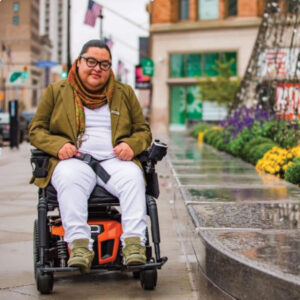Unlocking Economic Security for American Women by Advancing Disability Employment Policy
by Rylin Rodgers
Economic security is foundational to opportunity, dignity, and independence. Yet in 2025, as we commemorate the 35th anniversary of the Americans with Disabilities Act (ADA) and the 50th anniversary of the landmark legislation that opened the doors of education for all students with disabilities, these issues remain stubbornly persistent.
Today, for far too many American women, that security remains elusive — not because of a lack of talent or ambition, but because of outdated policies that limit access to employment and financial stability. In the United States, more than 61 million adults — approximately one in four — live with a disability, and women comprise a significant portion of this population.
The impact of disability is not limited to individual women; it ripples through families and communities. Millions of women shoulder additional responsibilities, caring for family members with disabilities or managing the financial and emotional challenges that come with supporting loved ones.
Unemployment Rates: Disability and Disabled Women
- As of mid-2025, the unemployment rate for people with disabilities is 10.0% overall, compared to 4.3% for those without disabilities.
- For women with disabilities specifically, the employment-population ratio is 22.3%, far below the 65.5% for nondisabled individuals.
- Disabled women experience unemployment at nearly twice the rate of nondisabled men (7.5% vs. 3.9%).
U.S. Bureau of Labor Statistics — Employment Status of People with Disabilities (July 2025)
The effects are felt well beyond the disabled individuals themselves: women across the nation, whether as mothers, daughters, partners, or caregivers, face economic and social obstacles when disability touches their families. As we work across the aisle to build a more inclusive economy, we must prioritize reforms that reflect the lived experiences and aspirations of both disabled women and the countless women whose lives are shaped by disability within their households.
These are not abstract policy levers — they are real tools that can unlock economic participation and self-determination for millions of people with disabilities, changing the experience for women in every state and community. The persistence of these barriers in 2025, even as we celebrate progress, is a call to action to honor the legacy of the ADA and educational equity not just with words, but with impactful reforms.
Three policy areas offer immediate, bipartisan opportunities for impact:
- Ending subminimum wage under Section 14(c) of the Fair Labor Standards Act
- Modernizing ABLE accounts,
- Raising the asset limits for Supplemental Security Income (SSI)
Section 14(c) of the Fair Labor Standards Act, a federal law enacted in 1938, allows employers to pay people with disabilities less than the federal minimum wage. While originally intended as a pathway to employment, this policy has become a barrier to economic mobility and inclusion. Today, thousands of women with disabilities — many of them in segregated work environments — earn pennies on the dollar for their labor. Despite decades of advocacy, this inequity has not yet been fully resolved, underscoring the urgency of action in this milestone year.
Ending subminimum wage is not a partisan issue: it’s a human one. States like Alaska, Maryland, and New Hampshire have already phased out 14(c) certificates, demonstrating that inclusive employment models are not only possible but successful. Bipartisan legislation like the Transformation to Competitive Integrated Employment Act (TCIEA), introduced by U.S. Representatives Bobby Scott (D-VA) and Pete Sessions (R-TX) in the House, and Senators Steve Daines (R-MT), Kirsten Gillibrand (D-NY), and Marsha Blackburn (R-TN) in the Senate, offers a roadmap to transition workers into competitive, integrated jobs with fair wages and support.
Women and all people with disabilities deserve the same labor protections as everyone else.
Achieving a Better Life Experience (ABLE) accounts were created to help people with disabilities save for the future without jeopardizing their eligibility for public benefits — a cliff that is a real barrier to employment and career growth. These accounts are tools for economic empowerment, allowing individuals to build assets, invest in education or housing, and plan for long-term needs.
In the United States, more than 61 million adults — approximately one in four — live with a disability, and women comprise a significant portion of this population.
Yet ABLE accounts remain underutilized. Many eligible individuals are unaware of them, and the reality that key provisions are scheduled to sunset in 2025 has created a sense of instability around this important option. Fortunately, bipartisan efforts continue to strengthen and expand access to these critical tools. The ENABLE Act, sponsored by Senators Eric Schmitt (R-MO), Chris Van Hollen (D-MD), John Boozman (R-AR), and former Senator Bob Casey (D-PA), passed the Senate in 2024, and similar ABLE provisions were signed into law as part of the reconciliation package in July 2025.
For women with disabilities and those who are caring for families that include individuals with disabilities, compounded economic disadvantages persist. ABLE accounts can be a lifeline, but only if policies remain robust and accessible as we mark these landmark anniversaries. They offer a way to save for emergencies, escape cycles of poverty, and pursue goals that foster independence and stability.
Supplemental Security Income (SSI) provides critical support to individuals with disabilities who have limited income and resources. But the program’s asset limits — $2,000 for individuals and $3,000 for couples — have not been updated since 1989. These outdated thresholds penalize saving and discourage financial planning, trapping recipients in poverty. Imagine telling a woman with a disability that saving for a car repair, a medical emergency, or a child’s education could cost her access to the benefits she relies on to survive. That’s the reality under current SSI rules, and it remains so even in 2025.
Raising the asset limits is an issue of fairness and modernization. The SSI Savings Penalty Elimination Act, introduced by Senators Catherine Cortez Masto (D-NV), Bill Cassidy (R-LA), and Ron Wyden (D-OR), would increase the limits to $10,000 for individuals and $20,000 for couples, indexed to inflation. This change would not only reflect today’s economic realities but also affirm the right of people with disabilities to build a secure financial future.
As someone who has worked at the intersection of disability policy and corporate engagement, I know that policy change doesn’t happen in a vacuum. It takes coalitions. It takes courage. And it takes commitment from every sector — including business. In this important anniversary year, it is essential that we work together to push for policies that ensure true economic opportunity for all.
That’s why I’m calling on large employers — especially those with a demonstrated commitment to disability inclusion, like my employer Microsoft — to join the disability community in urging Congress to act. These reforms are not just good policy; they are good business. They expand the talent pipeline, reduce dependency, and foster innovation through inclusion.
We need business leaders to speak up, to testify, to partner with advocates and policymakers. We need them to say clearly that economic security for women with disabilities and those caring for family members with disabilities is a priority and a key driver to economic and business growth, and we are ready to help make it real.
These are not abstract policy levers — they are real tools that can unlock economic participation and self-determination for millions of people with disabilities, changing the experience for women in every state and community.
These changes won’t solve every challenge overnight, but they will move us closer to a future where all women, regardless of disability status, have the opportunity to thrive. That’s a vision we can all get behind — Democrats and Republicans, business leaders and community advocates, policymakers and constituents. In 2025, as we reflect on 35 years of the ADA and 50 years of progress in educational access, let’s commit to finishing the work and ensuring that no woman is left behind.
Washington State ended the issuance of new Section 14(c) certificates beginning July 31, 2023.
In 2022, Microsoft, as a large employer committed to disability inclusion, and its vendors boosted wages for many supported employees in response to cost-of-living increases. Leaders foresaw potential concerns about benefits and partnered with Wise/BenefitU, an organization funded by the Development Disabilities Administration through the state of Washington, to provide guidance and benefits education. BenefitU worked with HR, employment support agencies, and government partners to offer personalized benefits planning and clear communication. Over 100 employees received education, and 41 participated in direct benefits planning. This proactive approach helped workers feel confident about advancing their economic security.
Microsoft’s experience can set an example for other corporations about what is possible through collaboration among employers, benefits experts, and state programs, as outlined in the Transformation to Competitive Integrated Employment Act.

Jeiri Flores is a dynamic disability rights advocate whose lived experience as a disabled person fuels her work in policy, education, and community empowerment. As someone who relies on Supplemental Security Income (SSI), raising the SSI asset limits would significantly enhance her financial stability — allowing her to save, invest in her education and career, and plan for long-term independence without risking the loss of essential benefits.
 Maisy Cyr is a professional from Hallowell, Maine, living with a rare digestive disorder known as microvillus inclusion disease, which requires lifelong use of total parenteral nutrition (TPN/HPN). Cyr’s lived experience with disability has shaped her understanding of independence and financial planning. ABLE Accounts — tax-advantaged savings accounts for individuals with disabilities — are critical to her ability to work and save without jeopardizing access to essential benefits. Cyr lost eligibility for Medicaid due to untapped assets in her Roth IRA, demonstrating how critical it is to strengthen ABLE accounts.
Maisy Cyr is a professional from Hallowell, Maine, living with a rare digestive disorder known as microvillus inclusion disease, which requires lifelong use of total parenteral nutrition (TPN/HPN). Cyr’s lived experience with disability has shaped her understanding of independence and financial planning. ABLE Accounts — tax-advantaged savings accounts for individuals with disabilities — are critical to her ability to work and save without jeopardizing access to essential benefits. Cyr lost eligibility for Medicaid due to untapped assets in her Roth IRA, demonstrating how critical it is to strengthen ABLE accounts.
Rylin Rodgers is the Disability of Policy Director at Microsoft.



